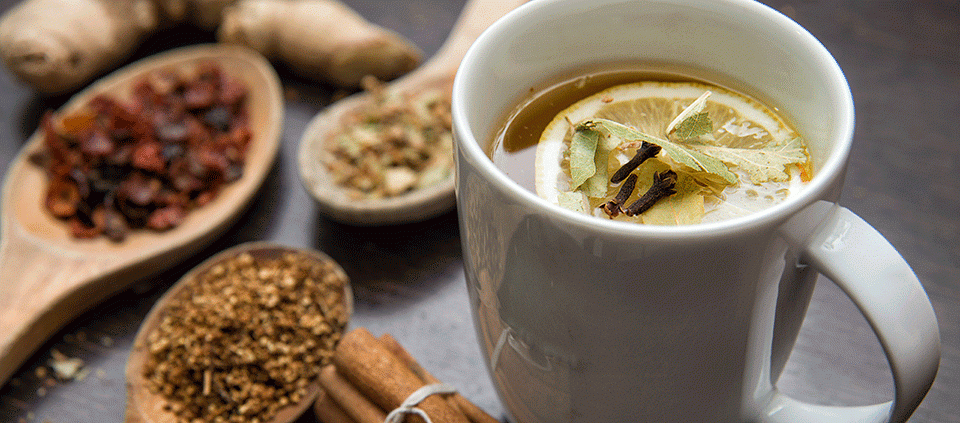Warm Up This Winter with Ayurvedic Herbal Teas

When the temperature drops, we naturally crave sweet, liquid warmth. This is when we tend to splurge on a flavored latte piled high with foam. But to satisfy that yearning all winter long—without consuming extra calories, sugar or caffeine—Ayurveda recommends delicious herbal teas to keep you hydrated, nourished, and satisfied. A cupful of cozy can offer a host of health benefits.
Due to their healthful properties, caffeine-free herbal teas are usually categorized as generally good for you. But Ayurveda teaches that each individual herb has particular qualities, benefits, and optimal usage to promote maximum wellness. Digestive issues? Congestion? Stress? Trouble sleeping? Ayurveda can offer a tasty herbal tea to prevent or reduce each of your winter woes.
Ready to explore? Start with one cup a day and notice how you feel; two cups of herbal tea is the recommended daily limit. Here are five of my favorites. (Remember, if you have any health concerns, check with your primary care physician before drinking herbal tea.)
Ginger Tea
What it’s good for: Ginger tea is great for cutting through heavy holiday foods and restoring balance to sluggish digestion. Try a cup of warming ginger tea to relieve nausea, stimulate metabolism, reduce gas and bloating, expel congestion and support good circulation. Because of its pungent kick and its ability to expel excess kapha, it’s a great caffeine-free choice for restoring mental alertness and enhancing focus when you’re feeling foggy or groggy.
Tip: Dry ginger powder (in a teabag) works well as an expectorant to remove excess phlegm from lungs. Fresh ginger is generally better for colds and to promote sweating out toxins. To make fresh ginger tea, steep 3 to 5 fresh, penny-sized slices in hot water.
When not to drink it: Avoid if you have ulcers, bleeding disorders or an inflammatory skin disease.
Hibiscus Tea
What it’s good for: The beautiful hibiscus flower produces a sweet, red, cooling tea that’s great for people who tend to run hot or feel inflamed (it’s excellent for pitta constitutions). Its blood-purifying properties are known for improving skin complexion, reducing fever and alleviating menstrual cramps and painful urination. Sweet on the tongue and gentle on the belly, it promotes mental ease and contentment. Hibiscus tea is also easy to digest and rich in Vitamin C, so it’s excellent for boosting immunity.
Tip: Store dried hibiscus flowers in a tightly sealed glass jar to maintain freshness.
When not to drink it: Avoid during pregnancy, when trying to conceive or if you have low blood pressure.
Tulsi (Holy Basil) Tea
What it’s good for: Try this Ayurvedic favorite to reduce fevers and headaches, fight off colds, break up lung congestion, soothe the nerves, and aid in healthy digestion. Tulsi is celebrated for its many health-promoting benefits and considered one of the most purifying herbs in the Ayurvedic cornucopia. Warming in nature, tulsi is said to support healthy emotions and enhance mental clarity—so it’s a great choice when you’re going through times of grief, stress or heartbreak.
Tip: Toss a few tulsi teabags in your suitcase in case you get sick while traveling.
When not to drink it: Avoid during pregnancy, when feeling overheated or when dealing with high-pitta conditions, such as ulcers, hot flashes, skin rashes and bloodshot eyes.
Cumin-Coriander-Fennel Tea (CCF)
What it’s good for: CCF is an Ayurvedic classic for healthy digestion. When dry-roasted and steeped in hot water, these three aromatic seeds produce a nutty-flavored tea that’s excellent any time of day. Touted for reducing gas and bloating, CCF is often taken to boost digestive strength without irritating the stomach or increasing acidity. CCF’s diuretic properties are said to support urinary tract health, and it’s commonly used during Ayurvedic cleanses to aid the detoxification process. And it’s good for everyone: It’s used for all three Ayurvedic doshas—vata, pitta, and kapha.
Tip: Try our CCF recipe, using organic seeds purchased at your local health food store, or order prepared organic tea online from BanyanBotanicals.org.
When not to drink it: Avoid during pregnancy.
Chamomile Tea
What it’s good for: Commonly known for its calming effects and ability to support a good night’s sleep, chamomile tea is harmonizing and soothing for the nerves. Very mild on the belly and useful for reducing gas and bloating, this aromatic herbal tea supports easeful digestion for all three doshas.
Tip: For stress relief and sleep support, it’s generally best to drink chamomile tea in the late afternoon or early evening.
When not to drink it: Avoid during pregnancy.
Larissa Hall Carlson, E-RYT 500, MA, 20-year Kripalu faculy and former Dean of the Kripalu School of Ayurveda, guides retreats, directs trainings, and provides Ayurvedic consultations across the country.
Full Bio and Programs